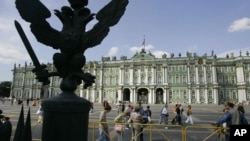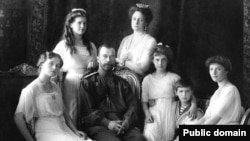For decades, the Soviet Union celebrated the October Revolution, which brought the communist Bolsheviks to power in Russia.
Nowadays, there's much less celebration.
The October Revolution, which took place in November 1917 under the modern Gregorian calendar, led to the rise of the Soviet Union and created the world's first communist government. Since the collapse of the Soviet Union in 1991, most Russians now see it as the "October Coup," and have mixed feelings about the empire the Bolsheviks built.
Soviet propaganda made the storming of the Tsar’s Winter Palace an iconic legend of the 1917 Bolshevik Revolution. None was more classic than the 1928 Soviet silent film by Sergei Eisenstein, October: Ten Days That Shook the World.
“We see in it crowds of people running from the Palace Square, climbing the gates, then running up this staircase and storming the Winter Palace,” says Hermitage Museum curator Elena Salomakha. “In reality there was nothing of the kind.”
Little resistance
That's because the Bolsheviks faced little resistance - much of the vast palace was being used as a hospital for wounded troops. The weak leaders of the provisional government, in power only months after the monarchy was deposed, were found and arrested.
The iconic main building of the Hermitage was the Russian tsars' Winter Palace from early 18th century until the 1917 revolution - a monumental, 1,500-room symbol of the strength of the Russian monarchy, now one of the largest and most venerable art museums in the world.
Salomakha, who is a member of the Hermitage's department of manuscripts and documents, gives a sober account of history that is less grandiose than Eisenstein's: “In fact, from the very beginning, the Bolsheviks themselves called it a coup. At the very beginning they were called ‘the February Revolution’ and ‘the October Coup.’ And we are now returning to the same terms.”
The Bolsheviks later executed the royal family, the Romanovs, and compared their actions to those of the leaders of the French Revolution, more than a century earlier.
Revolutionaries hungry for power
But 100 years after the uprising in St. Petersburg, many Russians see the Bolsheviks less as revolutionaries than as a power-hungry group biding their time until their moment arrived.
“They were all authoritarian. Their opponents' opinions or even their allies and coworkers' opinions meant nothing to them,” says Nikolay Tretyakov, director of the Smolny Historical and Memorial Museum. “They chose a certain doctrine and followed it. They wanted to seize power. Nothing else interested them.”
Critics acknowledge the Bolsheviks’ communist system leveled the field for a nation of peasants and removed a titled class of landowners.
“Neither can we turn down everything that was accomplished by the Soviet government during the 20th century," says the Russian State Museum of Political History’s Sergey Spiridonov. "The achievements were quite considerable. Besides some tragic pages, there were achievements in science, culture, art, as well as in the field of international policy.”
Many see 1917 as a tragedy
Yet modern Russia sees the bloodshed that accompanied the 1917 events - whether they were a revolution or a coup - as a tragedy, and debates how much of it was necessary.
The uprising in 1917 led to a bloody three-year civil war, chiefly between the Reds - the Bolshevik forces - and the Whites, who were monarchists and capitalists. Once the war was over, the victorious communists went on to shut down all opposition and enforce policies that led to mass starvation in Ukraine and other parts of the Soviet Union, as well as to execute or jail thousands of people suspected of disloyalty.
“All cultural achievements of the 1920s were thanks to the February revolution, as it opened something that had been suppressed,” Salomakha said. “As for the October revolution, now it is regarded as a negative phenomenon, because we all know what it resulted in - the repressions and the like, the state that repressed its own people in every possible way.”
Soviet propaganda no longer dictates how Russians must view the Bolsheviks and the coup they launched 100 years ago, but few doubt the impact their actions had in giving birth to the Union of Soviet Socialist Republics.
Olga Pavlova contributed to this report







